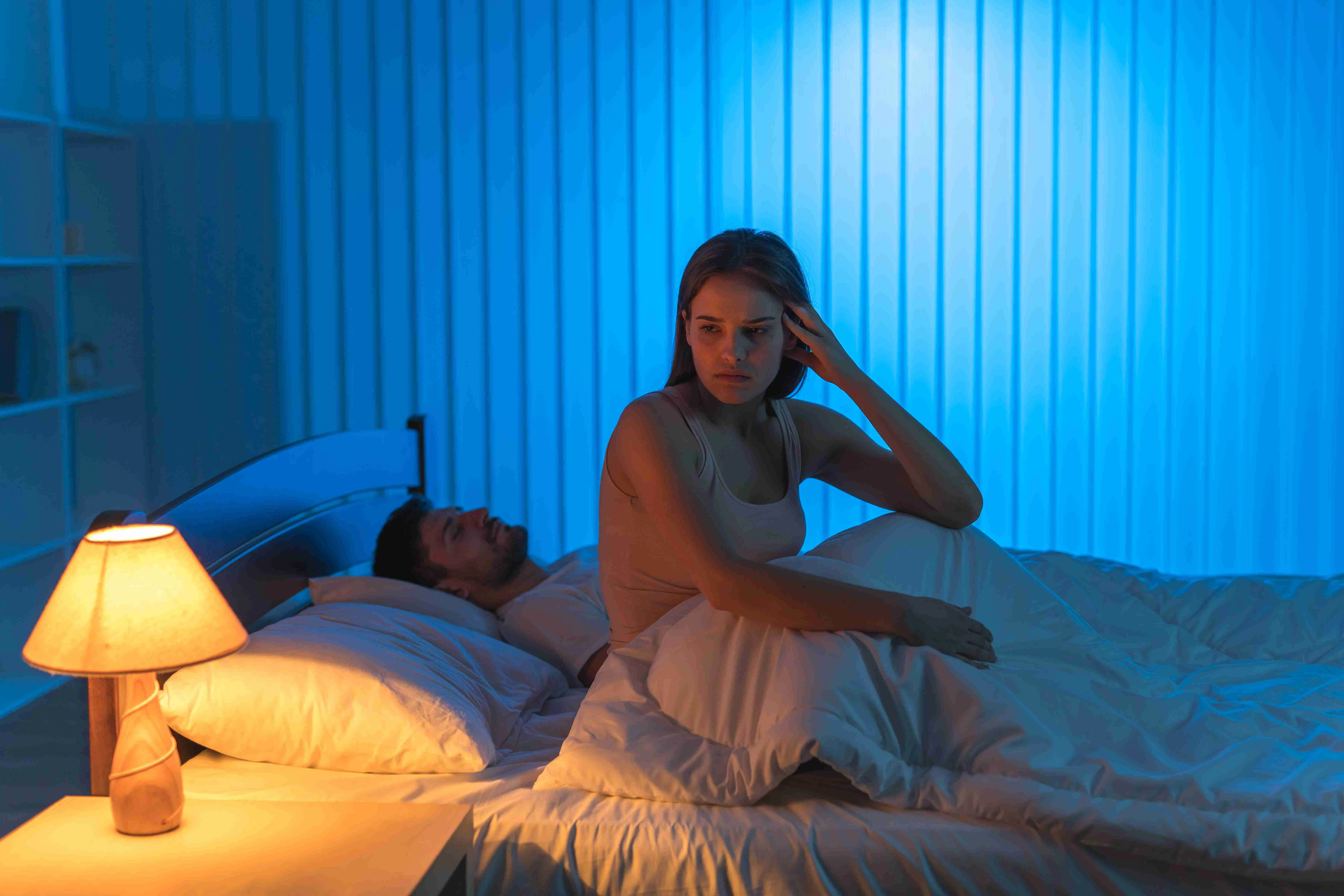The ketogenic diet has gained immense popularity for its potential health benefits, from weight loss to improved cognitive function.
However, this shift in eating habits can come with unexpected side effects. One of the most frustrating of these is keto insomnia—a sleep disturbance that can leave you tossing and turning when you should be resting.
In this article, we'll explore the intricate relationship between the ketogenic diet and sleep, uncover the reasons behind keto-induced insomnia, and provide practical strategies to help you achieve restful nights without compromising your low-carb lifestyle.
What is keto insomnia?
Keto insomnia refers to the sleep disturbances that some individuals experience when they begin following a ketogenic diet. This low-carb, high-fat eating plan prompts your body to enter a metabolic state called ketosis, which primarily burns fat for energy instead of carbohydrates.
While ketosis offers numerous potential benefits, such as weight loss, improved mental clarity, and better blood sugar control, it can also disrupt your sleep patterns, at least initially.
Causes of Keto Insomnia

Several factors contribute to the development of keto insomnia. Understanding these causes can help you address the issue more effectively.
Changes in Blood Sugar Levels
When transitioning to a ketogenic diet, blood sugar levels fluctuate as the body adapts to using fat instead of glucose for energy. These fluctuations can disrupt sleep patterns, making it difficult to fall or stay asleep.
Nutrient Deficiencies
Keto diets can sometimes lead to deficiencies in essential nutrients like magnesium or potassium, which are important for regulating sleep. Lack of these nutrients may result in insomnia, muscle cramps, or restlessness at night.
Electrolyte Imbalance
Low-carb diets can cause the body to excrete more water, leading to a loss of electrolytes such as sodium, magnesium, and potassium. An imbalance in these electrolytes can disrupt sleep by causing dehydration, muscle cramps, or heart palpitations.
Hormonal Changes
Switching to a keto diet affects hormone levels, particularly cortisol, the stress hormone, and melatonin, the sleep hormone. These hormonal shifts can make it harder to relax and fall asleep, contributing to insomnia.
Metabolic Adaptation
During the initial phase of a keto diet, the body undergoes metabolic changes to adapt to fat-burning instead of carb-burning for energy. This adaptation, known as ketosis, can lead to increased energy levels at night, making it difficult to wind down for sleep.
Stress and Anxiety
The dietary change, combined with the body’s adaptation to ketosis, can sometimes increase stress and anxiety. Elevated stress levels, especially due to disrupted routines or diet changes, can interfere with sleep quality and contribute to insomnia.
Common Symptoms of Keto Insomnia

If you're experiencing keto insomnia, you may notice one or more of the following symptoms:
Difficulty Falling Asleep at Night
Many people on a ketogenic diet struggle to fall asleep, particularly during the early stages of the diet when the body is adjusting to using fat for fuel instead of carbohydrates.
Frequent Waking During the Night
Keto insomnia often causes interrupted sleep, leading to frequent awakenings throughout the night, which can make it hard to stay asleep and get restorative rest.
Restless Sleep
Even when you do manage to sleep, it may feel shallow or restless, preventing you from reaching the deeper, more restorative stages of sleep necessary for recovery and rejuvenation.
Feeling Fatigued
Despite making an effort to rest, you may wake up feeling fatigued or unrefreshed, which can affect your overall energy levels and mood throughout the day.
Daytime Sleepiness
Persistent keto insomnia can result in excessive daytime sleepiness, leaving you feeling groggy or sluggish, which may affect your productivity and alertness during daily activities.
How Keto Insomnia Affects Your Health
Keto insomnia can have far-reaching consequences beyond just feeling tired during the day. Sleep deprivation can lead to a variety of health issues, including:
Impaired Cognitive Function
Lack of sleep can negatively affect your memory, concentration, and decision-making abilities. When insomnia persists, cognitive functions like problem-solving and focus may become impaired, making daily tasks more challenging.
Weakened Immune System
Sleep is essential for maintaining a healthy immune system. Insufficient sleep due to keto insomnia can weaken your body's ability to fight off infections, leaving you more susceptible to colds, flu, and other illnesses.
Increased Inflammation
Chronic sleep deprivation is associated with higher levels of inflammation in the body. This can worsen existing inflammatory conditions, such as arthritis, or contribute to the development of new issues like heart disease and diabetes.
Hormonal Imbalances
Sleep is crucial for regulating hormones that control hunger, stress, and overall well-being. Keto insomnia can disrupt these hormones, potentially leading to increased hunger, cravings, stress, and mood swings, which may counteract some of the benefits of the keto diet.
Managing Keto Insomnia

While keto insomnia can be frustrating, there are several strategies you can employ to improve your sleep quality and overcome this challenge.
Dietary Adjustments to Combat Keto Insomnia
- Increase Electrolyte Intake: Ensuring adequate intake of electrolytes such as magnesium, potassium, and sodium can help combat imbalances that may disrupt sleep, particularly as the keto diet can lead to their depletion.
- Adjust Macronutrient Ratios: Some individuals may benefit from tweaking their fat, protein, and carb ratios. Increasing healthy fats or adding small amounts of carbs at dinner may support better sleep quality.
- Consume Sleep-Promoting Foods: Foods rich in tryptophan, magnesium, and melatonin, such as nuts, seeds, and leafy greens, can promote relaxation and enhance sleep.
- Stay Hydrated: Dehydration can contribute to restlessness, so it's essential to drink enough water throughout the day. Just avoid excessive water intake close to bedtime to minimize disruptions from bathroom trips.
Lifestyle Changes to Improve Sleep on Keto
- Establish a Consistent Sleep Routine: Going to bed and waking up at the same time every day helps regulate your body's internal clock, making it easier to fall asleep and wake up naturally.
- Create a Sleep-Friendly Environment: A dark, cool, and quiet room promotes restful sleep. Consider using blackout curtains, earplugs, or a white noise machine to create an optimal sleep environment.
- Practice Relaxation Techniques: Techniques like deep breathing, meditation, or progressive muscle relaxation can help reduce stress and prepare your mind and body for sleep.
- Limit Screen Time Before Bed: Blue light from screens can interfere with melatonin production, the hormone responsible for sleep. Limiting screen exposure an hour before bed helps support better sleep.
- Exercise Regularly: Physical activity, especially earlier in the day, can improve sleep quality. However, avoid vigorous exercise close to bedtime, as it can have the opposite effect and make it harder to wind down.
Tips for Better Sleep on a Ketogenic Diet
In addition to the solutions mentioned above, here are some general tips that can act as a keto insomnia cures and help you optimize your sleep while following a ketogenic diet (low-carbohydrate diet):
- Stay Consistent: Maintain a regular eating schedule, especially for your last meal of the day. Keep your bedtime and wake-up time consistent, even on weekends, to regulate your circadian rhythm.
- Manage Stress Levels: Practice daily stress-reduction techniques such as meditation, deep breathing, or journaling.
- Avoid Caffeine and Stimulants Close to Bedtime: Limit caffeine consumption to the morning and early afternoon hours. Be mindful of hidden sources of caffeine, such as chocolate or certain teas, and consider switching to decaffeinated versions of your beverages in the evening.
- Consider Your Individual Needs: Don't hesitate to consult with a healthcare professional or nutritionist specializing in ketogenic diets if you continue to struggle with sleep issues.
FAQs
How long does keto insomnia last and when does keto insomnia start?
The duration of ketosis insomnia can vary from person to person, but it is generally considered a temporary side effect. For most individuals, sleep disturbances tend to improve within a few weeks as their bodies adapt to the ketogenic diet. However, some may experience prolonged low-carb insomnia, in which case seeking professional guidance may be beneficial.
Can keto insomnia lead to weight gain or stall weight loss?
Yes, chronic sleep deprivation can potentially contribute to weight gain or stall weight loss efforts. Lack of sleep can disrupt hormones that regulate appetite and metabolism, leading to increased hunger and cravings. Additionally, sleep apnea and fatigue may reduce physical activity levels, further hindering weight loss goals.
Is it safe to take melatonin supplements while on the ketogenic diet?
Yes, keto and sleep are related, as you can have trouble sleeping on keto as there are lots of keto sleep problems. Melatonin supplements are generally considered safe for most people when taken in appropriate doses. However, it's always best to consult with a healthcare professional, especially if you have any underlying medical conditions or are taking other medications that may interact with melatonin.
Does keto insomnia go away, and can exercise help improve sleep quality on the keto diet for insomnia?
Regular exercise can be beneficial for improving sleep quality on the ketogenic diet. However, it's important to avoid intense workouts close to bedtime, as they can be stimulating and make it harder to fall asleep. Aim for moderate exercise earlier in the day, and engage in relaxing activities before bedtime.
Why can't I sleep on keto?
Yes, the keto diet can affect sleep, particularly during the initial adjustment period. The reduction in carbohydrates can lower serotonin and melatonin production, disrupting sleep patterns. Additionally, keto flu symptoms, like headaches and dehydration, may make it harder to sleep. Over time, some people report improvements in sleep once their body adapts, but others may continue to experience issues like insomnia or restless sleep.
Conclusion
By understanding the complex interplay between your diet and sleep patterns and implementing targeted strategies, you can overcome this low-carb diet insomnia (keto insomnia).
Remember, quality sleep is crucial for overall health and can significantly impact the success of your ketogenic journey.
Jessica H.
Jessica is a reviewer, writer, and sleep enthusiast at Sleepiverse. Jessica graduated with her master's degree in Nursing research and education. She is a registered nurse and currently works in the Intensive Care Unit. Since becoming a nurse, Jessica has worked the night shift, which means a disrupted sleep schedule. Knowing she needed to function at her best while caring for patients at night, she spent a lot of time researching how to sleep well with a difficult schedule.


